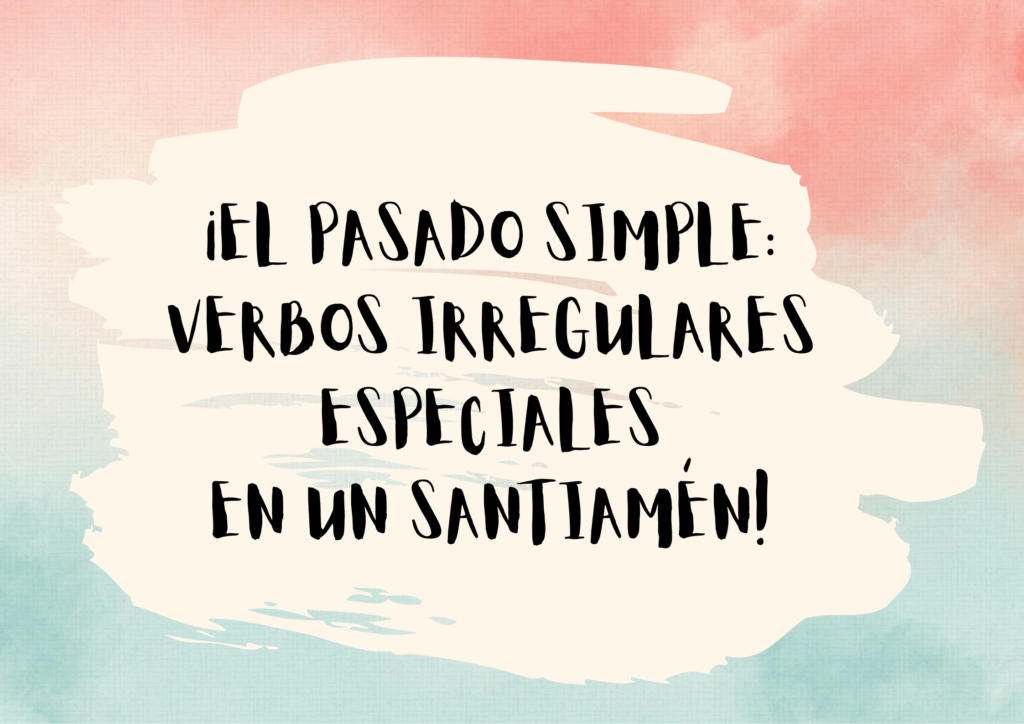
¡Hola, amigos! Did you know that in Spanish, there are numerous verbs that are irregular in the simple past? But wait, there’s more! Many of these verbs can be grouped together, making it easier to learn them all at once. Once you master these verb groups, you’ll be able to communicate in the simple past with ease and confidence. Get ready to take your Spanish skills to the next level!
1. IRREGULAR VERBS SHARING THE SAME ENDINGS IN THE SIMPLE PAST
A. ANDAR, ESTAR ,TENER
The verbs andar (to go, to walk, to ride, to function), estar (to be) and tener (to have), and all verbs ending in tener (like “mantener”), have uv in the simple past root, and share the same irregular endings. Let’s take the verb tener as a model. Listen to Gael, a voice from Spain:
| Person | Conjugation |
|---|---|
| yo | tuv + e |
| tú | tuv + iste |
| usted | tuv + o |
| él ella | tuv + o |
| nosotros nosotras | tuv + imos |
| ustedes | tuv + ieron |
| ellos ellas | tuv + ieron |
| vos | tuv + iste |
| vosotros vosotras | tuv + isteis |
Simple Past Roots:
| Infinitive | Past Root |
|---|---|
| andar | anduv |
| estar | estuv |
| tener | tuv |
Now, let’s play this game. Just click start!
B. CABER, PODER, PONER, SABER
The verbs caber (to fit), poder (to be able), poner (to put) and saber (to know) all have the letter u in the simple past root, and have the same endings as the verbs above. Let’s take the verb poner as a model. Listen to Carina, also a voice from Spain:
| Person | Conjugation |
|---|---|
| yo | pus + e |
| tú | pus + iste |
| usted | pus + o |
| él ella | pus + o |
| nosotros nosotras | pus + imos |
| ustedes | pus + ieron |
| ellos ellas | pus + ieron |
| vos | pus + iste |
| vosotros vosotras | pus + isteis |
Simple Past Roots:
| Infinitive | Past Root |
|---|---|
| caber | cup |
| poder | pud |
| poner | pus |
| saber | sup |
Now, let’s play this game!
C. HACER, QUERER, VENIR
The verbs hacer (to do, to make), querer (to want) and venir (to come) all have an i in the simple past, and have the same endings as the verbs above. Let’s take the verb querer as a model. Listen to Martina, a voice from Argentina:
| Person | Conjugation |
|---|---|
| yo | quis + e |
| tú | quis + iste |
| usted | quis + o |
| él ella | quis + o |
| nosotros nosotras | quis + imos |
| ustedes | quis + ieron |
| ellos ellas | quis + ieron |
| vos | quis + iste |
| vosotros vosotras | quis + isteis |
Simple Past Roots:
| Infinitive | Past Root |
|---|---|
| hacer | hic |
| querer | quis |
| venir | vin |
And now, let’s play and have fun!
2. IRREGULAR VERBS WITH ROOTS ENDING IN J
The verbs decir (to say, to tell), traer (to bring), and all verbs ending in decir, ducir and traer (like “producir”) have a root ending in j in the simple past, and in most cases have the same irregular endings as the verbs above. However, the endings for ustedes, ellos and ellas is eron (instead of “ieron”). Let’s take the verb decir as a model. Listen to Diego, a voice from Mexico:
| Person | Conjugation |
|---|---|
| yo | dij + e |
| tú | dij + iste |
| usted | dij + o |
| él ella | dij + o |
| nosotros nosotras | dij + imos |
| ustedes | dij + eron |
| ellos ellas | dij + eron |
| vos | dij + iste |
| vosotros vosotras | dij + isteis |
Simple Past Roots:
| Infinitive | Past Root |
|---|---|
| decir | dij |
| traer | traj |
| ducir (example: traducir) | duj |
Now, let’s learn this!
3. IR, SER
The verbs ir (to go) and ser (to be) are the same in the simple past. And they are very irregular! Meaning is made clear by the context of the sentence. Listen to Lara, a voice from Bolivia:
| Person | Conjugation |
|---|---|
| yo | fu + i |
| tú | fu + iste |
| usted | fu + e |
| él ella | fu + e |
| nosotros nosotras | fu + imos |
| ustedes | fu + eron |
| ellos ellas | fu + eron |
| vos | fu + iste |
| vosotros vosotras | fu + isteis |
Let’s learn this in a snap!




